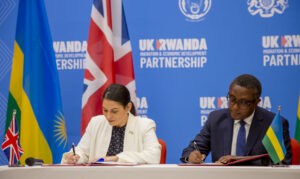UK Faces £50 Million Bill After Scrapping Rwanda Migration Deal: A Costly Oversight?
|
Getting your Trinity Audio player ready...
|

In April 2022, Rwanda and the United Kingdom established the Migration and Economic Development Partnership, a controversial initiative aimed at deterring illegal immigration by relocating certain asylum seekers from the UK to Rwanda for processing and potential resettlement. The UK government argued that this scheme would discourage dangerous crossings of the English Channel and disrupt human smuggling networks.
Key Components of the Agreement
Under the deal, individuals who arrived illegally in the UK could be transferred to Rwanda, where their asylum claims would be assessed. Successful applicants would be granted asylum or other forms of protection in Rwanda, with no option to return to the UK. The British government committed significant financial resources to support the partnership, including an initial £140 million payment, followed by further instalments that brought the total expenditure to £290 million.
Additionally, the UK agreed to pay up to £171,000 per person relocated, covering integration costs over five years. Despite these substantial financial commitments, no deportations under the scheme were carried out due to ongoing legal challenges and operational obstacles. In November 2023, the UK Supreme Court ruled the policy unlawful, citing concerns about Rwanda’s human rights record and the risk of refoulement—the forced return of asylum seekers to countries where they might face persecution.
Termination and Fallout
Following the July 2024 general election, the newly elected Labour government, led by Prime Minister Keir Starmer, announced the cancellation of the Rwanda deportation scheme, citing legal, ethical, and financial concerns. However, reports indicate that the UK government failed to formally terminate the agreement in accordance with its contractual obligations. According to Rwanda’s Government Spokesperson Yolande Makolo, it also asked the Rwandan government “to quietly forego the payment based on the trust and good faith existing between our two nations.”
Further developments since then have led to a change of heart. Ms Makolo expressed disappointment that the UK had “breached this trust” by coercing Rwanda into undertaking measures that would compromise the country’s national security. Then there was the other matter of the comments made by Lord Collins in the UK Parliament.
Financial and Political Controversy
The UK government’s handling of the Rwanda deal’s termination has drawn significant criticism. Opposition figures and political analysts have questioned why proper procedures were not followed to avoid incurring additional costs. With the scheme already costing UK taxpayers hundreds of millions of pounds, the additional £50 million charge has reignited debates about the fiscal responsibility of such agreements and the broader implications for immigration policy.
This episode highlights the complexities and risks involved in international partnerships, particularly when dealing with sensitive issues like asylum and migration. The UK government’s approach to scrapping the Rwanda deal demonstrates the need for greater transparency, accountability, and legal foresight when negotiating and concluding agreements of this magnitude. As the government navigates the fallout, it faces renewed scrutiny over its handling of public funds and diplomatic commitments.

We have been in the media for the last 20 years all across East Africa. We leverage on this experience to provide news and entertainment for every taste. Stay tuned.
ALL CONTACTS
- KK 26th Ave, Kigali, Rwanda
- Office +250 790 395 056
- hello@eamgtv.com
- 24 hours
SUBSCRIBE
EAMG TV
A product of East Africa Media Group| Top Quality Content | Events Planning | Your gateway to East Africa | Amplifying your milestones
Leave a Reply